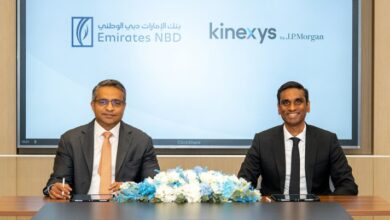Bahrain opens its doors for Blockchain startups in Shipping and IOT

Bahrain enacts new laws and technologies allowing blockchain startups not only in fintech but other sectors to thrive.
The Kingdom of Bahrain though small in geographic size has always been grand when it comes to aspiring and building for the future. Historically Bahrain has diversified its economic activity given that oil and gas is not as prevalent as in other GCC countries. As such Bahrain has been able to a great extent to build strong sectors in finance, tourism, manufacturing and others. It is a leader when it comes to Islamic Financial sector in GCC with only Malaysia ahead of it. Its economic diversity and leadership in some sectors is largely due to its talented indigenous national population. Bahrain has always dubbed itself as a business friendly country building on its laws, regulations, and people.
In addition Bahrain has been the first to implement latest technologies and infrastructure. Bahrain was the first country to launch nationwide 3G network in 2004 as well as develop the Fintech regulatory sandbox. The firsts are still coming and Bahrain continues to attract entrepreneurs and disruptive new technologies and startups.
UNLOCK met with Dr. Simon Galpin, Managing Director of EDB (Economic Development Board) Bahrain during the MIT Arab Startup Competition in Beirut. Over the past 20 years, The EDB has propelled itself as a catalyst for economic reform and diversification. Dr. Galpin states, “In more recent years we have been focusing on emerging startups in the Fintech space utilizing our inherent strength in the financial services sector as well as our workforce and its experience. Emerging Fintech startups can thus draw not only on the available talent pool but also utilize our regulatory environment.” He adds, “The EDB is working to position Bahrain as a center for Fintech companies and hopefully introduce new Fintech products into the region.”
According to Galpin being a small compact economy has benefited Bahrain especially when it comes to the Bahrain Fintech Bay. Startups setting up in Bahrain can do so anywhere and do not have multiple regulatory entities to deal with but rather only one which is the Central Bank of Bahrain. Galpin explains, “We offer an advantage in that we have only one single financial services regulator. Moreover one of the beauties of our regulatory sandbox is the partnership with Central Bank that not only shapes the regulatory environment to assist startups to flourish while they learn about Bahrain and GCC but is also allowing the Central bank to learn from these startups. This has positioned us as leaders when it comes to onshore regulatory sandboxes which allow Fintech startups to do business and test products with clients in Bahrain from day one. This has been one of our major attraction points.”
Currently EDB is monitoring around 100 startups in its regulatory sandbox, and has seen these numbers double year after year. Of those startups, a sizable percentage has a blockchain dimension to them or is dealing with cryptocurrencies according to Galpin. Some of those startups include Swiss Blockchain startup Pikcio, Rain exchange which will be graduating soon from sandbox, BitArabia, Palmex, Belfrics and many others. Galpin adds, “The effect this has had is not only in the improvement in quality of startups but also the exposure this is providing to traditional SME (Small Medium Enterprises) and family businesses as well. This has also benefited big corporates such as banks, telecoms and others. The growth of startup ecosystem not only helps to foster entrepreneurship but also benefits long standing businesses and sectors with innovation and talent pool.”
Galpin gives an example of the University of Bahrain which has embraced blockchain by issuing diplomas utilizing blockchain giving both total transparency and curbing the falsification of degrees
With the new laws, regulations, and technological implementations sweeping Bahrain, Blockchain technology startups will be able to flourish not only in Fintech arena but also shipping, transportation, and IOT within the concept of Smart Cities. Galpin states, “We recently were the first country in the world to enact the model law on Electronic Communications and Transactions (MLETR) which was developed by the United Nations Commission on International Trade Law (UNICITRAL). This is a model law that transforms all documentation related to shipping. This will help to bridge trade and finance seamlessly digitizes the economy further.”
He adds, “This will foster new business models because the law creates records that are functionally equivalent to commercial documents and instruments issued on paper, such as bills of lading, bills of exchange, cheques, promissory notes and warehouse receipts. These electronic documents allow the person who holds them to claim payment of a sum of money or delivery of certain goods, enabling the merger of the finance and logistics supply chains in a single data workflow.” This could especially be beneficial for blockchain startups in supply chain, shipping, transportation, airfreight and logistics.
KPMG reported on this and recognized Bahrain as having the most liberalized competitive IT sector in the GCC with the lowest costs for critical ICT metrics.
Blockchain startups will also benefit from the launching of the first nationwide 5G network in Bahrain. Blockchain and IOT go hand in hand when building SmartCities and digital economies. Galpin states, “5G network is excellent for connecting devices, and with blockchain we can securely connect them, this will bring in new startups that can develop business models and test them on the ground here.”
Bahrain will be hosting the Global Entrepreneurship Congress this month. Bahrain also announced during the World Economic Forum in Jordan the roll-out of a new program of support for the 100 Arab start-ups. The special program will include, access to the Bahraini market for all companies that have been recognized under the 100 Arab Start-Ups, fast-tracking of applications to establish a presence in Bahrain and the opportunity to pitch and access funding from Bahrain’s Sovereign Wealth Fund, as well as the VC partners of Al Waha Fund of Funds and family offices in the Kingdom. Simon Galvin answered our question on STOs and ICO regulations, “We have yet to enter this space as it is continuously developing and we need to understand its effects while we focus on building the ecosystem. We have however embraced crowd funding and peer to peer lending as a means for startups to raise funds.”




